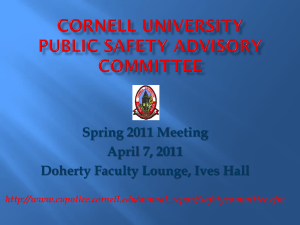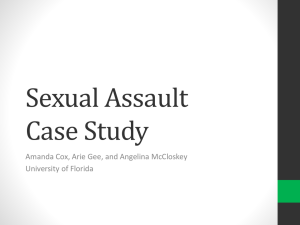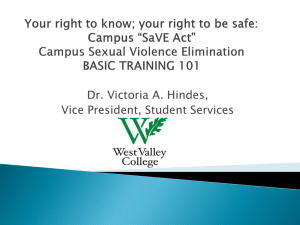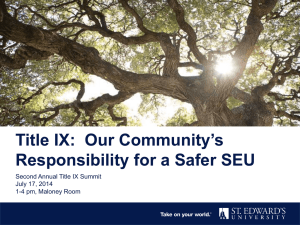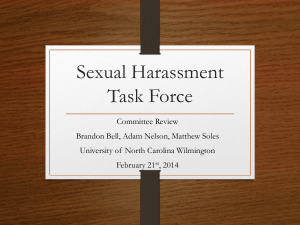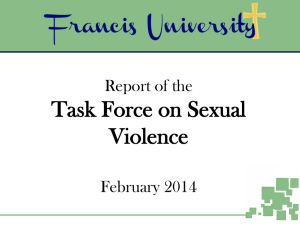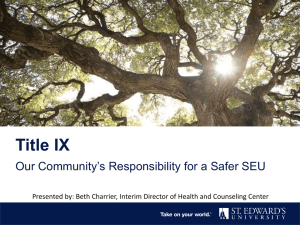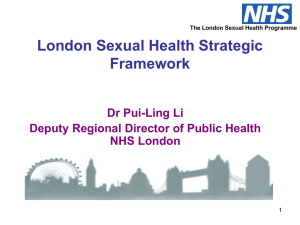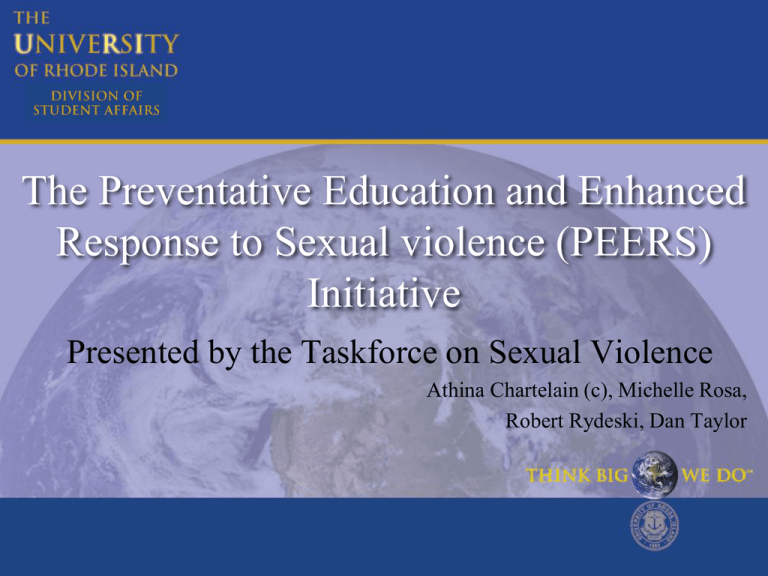
The Preventative Education and Enhanced
Response to Sexual violence (PEERS)
Initiative
Presented by the Taskforce on Sexual Violence
Athina Chartelain (c), Michelle Rosa,
Robert Rydeski, Dan Taylor
Overview
• Background Information on URI and Sexual Violence
• Taskforce on Sexual Violence
• P.E.E.R.S. Initiative
• Strategic Planning
• University Goals
The Status of Sexual Violence
Findings from The Campus Sexual Assault (CSA) Study include:
•
•
•
•
•
•
•
Many women (88%) have never consumed a drink left unattended or consumed a drink
given to them by a stranger (76%).
One-quarter of the sample (25%) reported consuming alcohol or drugs before sex at
least once a month, and slightly fewer (23%) were drunk or high during sex at least
once a month.
Eighteen percent experienced an attempted (13%) and/or completed (13%) sexual
assault since entering college.
Among the total sample, 5% experienced a completed physically forced sexual assault,
but a much higher percentage (11%) experienced a completed incapacitated sexual
assault.
Sexual assaults were most likely to occur in September, October and November, on
Friday or Saturday nights, and between the hours of midnight and 6:00 a.m.
Most victims of physically forced or incapacitated sexual assault were assaulted by
someone they knew (79% and 88%).
Freshmen and sophomores are at greater risk for victimization than juniors and seniors.
Our Institution
•
•
•
•
•
•
•
•
•
•
Mid-size four year public college offering both undergraduate and graduate
programs.
13,431 students are enrolled on a full time basis, and 2,608 attend part time.
Predominantly White Institution
Located in the Northeast Region
Residential Campus with off campus students
Traditional age students
Is not a dry campus
The university offers more than 100 bachelor’s and 80 graduate degree
programs, as well as first professional and doctorate programs.
55% Women and 45% Men
11 Incidents of Forcible Sexual Offenses in 2012
Current Programs and Policy at URI
• URI Peer Advocacy Program
– A team of specially trained students who create and perform interactive workshops
and programs to educate and increase awareness regarding: Partner Violence,
Stalking Alcohol, Sexual Abuse, Sexual Harassment, and Drugs.
• Office of Civility Education
– works to encourage a civil community that upholds the pursuit of knowledge with
honesty, integrity, and courage while respecting the rights and dignity of all others.
• Bias Response Team
– works to gather information about bias incidents and to support those who have
witnessed, or become a target, of an act of bias.
• Student Handbook Information on Sexual Violence
– Current information on student conduct policy and information available to URI
community members.
Impact of VAWA Reauthorization in 2014
• VAWA Reauthorization pertaining to colleges and universities
– Primary Prevention and Awareness programs
– Annual reporting of statistics for various criminal offenses
– Institutions inform students of procedures following an act of sexual
violence.
• In national news, President Obama is taking a stand on
preventing sexual violence on colleges campuses.
Weekly Address: Taking Action to End Sexual Assault
Taskforce on Sexual Violence
Division of Student Affairs
Division of
Student
Affairs
Local
Community
Organizations
Office of the
Provost
VPSA, Dean of Students, Health Services,
Counseling Center, HRL, Greek Affairs,
Athletics, Student Activities
Office of the Provost
Key
Stakeholders
Office of
Community,
Equity, and
Diversity
Public Safety
and Police
Human
Resources
Faculty Liaison Committee Chair, Vice
Provost, Dean of University College (New
Student Programs)
Office of Community, Equity, and
Diversity
Assistant Vice President (Chief Diversity
Officer), LGBTQ Center, Women’s Center
Taskforce on Sexual Violence
Local Community Organizations
Division of
Student
Affairs
Local
Community
Organizations
No More, RI Crisis Assistance Center,
Office of the
Provost
Faculty Liaison Committee Chair, Vice
Provost, Dean of University College (New
Student Programs)
Key
Stakeholders
Office of
Community,
Equity, and
Diversity
Public Safety
and Police
Human
Resources
Public Safety
Human Resources
Assistant Vice President (Chief Diversity
Officer), LGBTQ Center, Women’s Center
Taskforce Response
The Preventative Education and Enhanced
Response (PEERS) Initiative
A multifaceted approach to address sexual violence on
our campus through policy development, programming,
training, and community outreach.
P.E.E.R.S. Initiative
Vision:
The P.E.E.R.S. Initiative seeks to establish a campus community that is
educated on, preventative of, and responsive to acts of sexual violence,
in an effort to eliminate this form of abuse on our campus.
Mission:
The P.E.E.R.S. Initiative will accomplish this vision through the creation
of new campus policies that provide the university with a unified response
to the sensitive needs of both the accused and survivor, intentional
programming efforts that raise levels of awareness and knowledge of
sexual violence, and publicity campaigns to illuminate the issue on our
campus and demystify the myths of sexual violence.
P.E.E.R.S. Initiative
Values:
These values serve as the cornerstone of the P.E.E.R.S. Initiative. It is
with these values that we strive to build a campus community that is
caring and respectful of one another.
•
•
•
•
•
Confidentiality - Safeguarding the identities of persons involved
Dignity - Appreciation and value for the whole individual
Respect - Honoring others by treating them with care and courtesy
Trust - Ability for students to place confidence within us
Safety - Provision of space that is free from insecurity
Our Triangulated Approach
Policy
Publicity
Programming
Policy Development
Faculty and Staff
• Implement a university-wide syllabus statement which addresses
sexual violence and community standards for all members.
• Establish a liaison in each academic department who will report to the
Faculty Liaison Chair and the Office of the Provost on the taskforce.
• Include Bystander Training at New Employee Orientation.
• Mandate a sexual violence awareness and prevention assessment
each year as part of employee evaluation.
• For all university employees there will be a conference held in August
for existing staff and faculty for bystander training intervention.
Policy Development
Students
• Develop amnesty policies for undocumented students and students
involved in substance abuse incidents of sexual violence.
• Implement sexual violence questionnaires as intake forms for Health
Service and Counseling Center Visits.
• Mandate a sexual violence awareness and prevention virtual
assessment to be completed by the end of the first week of classes.
• Reevaluate housing options for accused and victims of sexual
violence through emergency vacancies.
Programming:
Consent is Sexy & A Call to Men
A Call to Men
Consent is Sexy
Programming:
Bystander Intervention Training
Live The Green Dot
•
•
•
•
Bystander Intervention Training (BIT)
Students will learn about effective bystander intervention techniques during
incidents of sexual violence
Creative activities students will do to deeply reflect on violence prevent are:
– writing and presenting persuasive speeches
– Creating public service announcements
After successfully completing the training, participants will receive a BIT card
Publicity
URI Violence Prevention
Circle of 6
Publicity
URI PEERS Initiative
@uripeers
P.E.E.R.S. Initiative 3 Year Strategic Plan
Spring 2014
Policies
Programming
Publicity
Fall 2014
Incorporate Departmental Liaison to Task Force
Develop BIT for new employees and current
employees
Develop Amnesty Policies for Undocumented
and Substance Abuse
Develop University Syllabi Statement
Develop Health & Counseling Services Intake
Questionnaire
Pilot Annual Employee and Student
Assessments
Increase number of Peer Advocates to 250
members
Develop Bystander Intervention Training (BIT)
Curriculum
Develop “Consent is Sexy” campaign
Develop “A Call to Men” campaign
Develop and release Initial Assessment of
awareness of Peer Advocacy program and
sexual violence resources
URI Presidential address, introducing P.E.E.R.S.
Initiative
Develop and launch social media outlets
(Facebook, Twitter, YouTube)
Refabricate website
Registry opens
Spring 2015
Launch BIT for all employees
Launch Syllabi Statement
Implement Health & Counseling
Services Intake Questionnaire
Launch Amnesty Policies for
Undocumented and Substance
Abuse
Refine Piloted Annual Employee
and Student Assessments
Increase number of Peer
Advocates to 265 members
Launch “Consent is Sexy”
campaign
Launch “A Call to Men” campaign
Analyze Initial Assessment data
Develop “No More” community
partnership campaign
Develop and recruit campus
leaders for “What is Consent?”
public service announcement
Launch Annual Employee
Assessment
Launch Annual Student
Assessment
Increase number of Peer
Advocates to 280 members
Launch “No More” community
partnership campaign
Refine BIT Curriculum
Develop “Circle 6” campaign
Assess “Consent is Sexy” and
“A Call to Men” campaigns
Assess “No More” campaign at
the end of academic year
Launch “What is Consent?”
public service announcement
Assess “What is Consent?”
public service announcement at
the end of academic year
P.E.E.R.S. Initiative 3 Year Strategic Plan
Policies
Spring 2015
Fall 2015
Spring 2016
Analyze Annual Employee
Assessment data
Analyze Annual Student
Assessment data
Increase number of Peer
Advocates to 290 members
Re-Launch “Consent is Sexy”
Campaign
Launch “Circle 6” campaign
Launch Annual Employee Assessment
Launch Annual Student Assessment
Programming
Publicity
Increase number of Peer Advocates to 280
members
Launch “No More” community partnership
campaign
Refine BIT Curriculum
Develop “Circle 6” campaign
Assess “Consent is Sexy” and “A Call to
Men” campaigns
Assess “No More” campaign at the end of
academic year
Launch “What is Consent?” public service
announcement
Assess “What is Consent?” public service
announcement at the end of academic year
Develop and recruit campus
leaders for “What is
Consent?” public service
announcement
Distribute Annual Employee
Assessment
Distribute Annual Student
Assessment
Increase number of Peer
Advocates to 300 members
Re-Launch “No More”
community partnership
campaign
Refine BIT Curriculum
Maintain “Circle 6”
campaign
Re-Launch “What is
Consent?” public service
announcement
Assess “What is Consent?”
public service
announcement at the end
of academic year
University Goals
Meeting the Transformational Goals of the University
• Goal 4: Build a Community at the University of Rhode Island that
Values and Embraces Equity and Diversity.
Meeting the Goals of the Division of Student Affairs
• Goal 5: Enhance the student experience so that it positively impacts
student persistence and retention.
• Goal 6: Students utilize technology and are well informed of
programs, services and events through the Divisions advanced
use of technology.
Conclusion
As President Obama stated, “Because when a child starts to question
their self-worth after being abused, and maybe starts withdrawing… or a young
woman drops out of school after being attacked… or a mother struggles to hold
down a job and support her kids after an assault… it’s not just these individuals
and their families who suffer. Our communities – our whole country – is held
back.”
Although sexual violence continues to happen on college campuses at
alarming rates, we are dedicated to educating our students. So while our
approach may not completely eradicate this issue, we are dedicated to the
development of various programming and policy development to address these
issues.
It is through collaborative efforts and partnership on our campus and
within our community that we will reach a college campus that is educated on,
preventative of, and responsive to acts of sexual violence, in an effort to eliminate
this form of abuse on our campus.
References
Barone, R.P., Wolgemuth, J.R., Linder, L. (2007). Preventing sexual assault through
engaging college men. Journal of College Student Development , 48(5), pp. 585594.
Benjamin, M. & Hamrick, F.A. (2011). How does the perception that learning takes place
exclusively in classrooms persist? Expanding the learning environment. In P.M.
Magolda & M.B. Baxter Magolda’s Contested Issues in Student Affairs: Diverse
Perspectives and Respectful Dialogue. Sterling, VA: Stylus.
Kneeling, R.P. (Ed.) (2004). Learning Reconsidered: A campus-wide focus on the student
experience . Washington, DC: American College Personal Association & National
Association of Student Personnel Administrators.
Krebs, C.P., Lindquist, C.H., Warner, T.D., Fisher, B.S., & Martin, S.L. (2007). The Campus
Sexual Assault (CSA) Study. National Institute of Justice.
Katz, J. (2013). Violence against women is a men’s issue. In M. Adams, W.J. Blumenfeld,
C. Castaneda, H.W. Hackman, M.L. Peters, & X. Zuniga’s Readings for Diversity
and Social Justice (3rd edition), pp. 342-346.


